Background
Jacques Rancière was born on June 10, 1940, in Algiers, Alger, Algeria. He spent his childhood partly in Algeria and partly in Marseille.

1988
Paris, France
Jacques Rancière in 1988.
2006
Calle Américo Vespucio, 2, 41092 Sevilla, Spain
Jacques Rancière at a conference held in the Universidad Internacional de Andalucía, in Seville (Spain) in 2006.
2009
France
Portrait of Jacques Rancière in 2012
2010
Zagreb, Croatia
Jacques Rancière lectures at Jedinstvo in Zagreb.
2012
Paris, France
Jacques Rancière in 2012.
2012
9 de Julio 1122, S2000 Rosario, Santa Fe, Argentina
Jacques Rancière at the Facultad Libre de Rosario.
2013
Paris, France
Jacques Rancière in 2013.
45 Rue d'Ulm, 75005 Paris, France
Rancière studied philosophy at the École Normale Supérieure in Paris under the structuralist Marxist philosopher Louis Althusser.
Like many of Althusser’s students, Rancière was an active member of the Union des Étudiants Communistes.













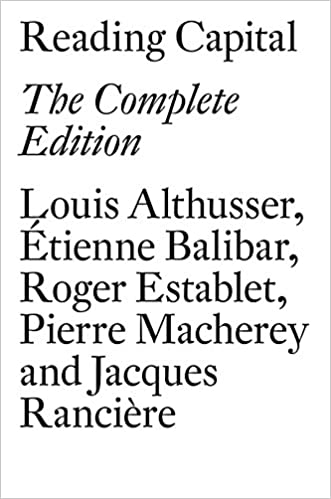
(A classic work of Marxist analysis, available unabridged ...)
A classic work of Marxist analysis, available unabridged for the first time Originally published in 1965, Reading Capital is a landmark of French thought and radical theory, reconstructing Western Marxism from its foundations. Louis Althusser, the French Marxist philosopher, maintained that Marx’s project could only be revived if its scientific and revolutionary novelty was thoroughly divested of all traces of humanism, idealism, Hegelianism, and historicism. In order to complete this critical rereading, Althusser and his students at the École normale supérieure ran a seminar on Capital, re-examining its arguments, strengths, and weaknesses in detail, and it was out of those discussions that this book was born. Previously only available in English in highly abridged form, this edition, appearing fifty years after its original publication in France, restores chapters by Roger Establet, Pierre Macherey, and Jacques Rancière. It includes a major new introduction by Étienne Balibar.
https://www.amazon.com/Reading-Capital-Complete-Louis-Althusser/dp/178478141X/ref=sr_1_1?dchild=1&keywords=Jacques+Ranci%C3%A8re+Reading+Capital&qid=1598617651&s=books&sr=1-1
1965
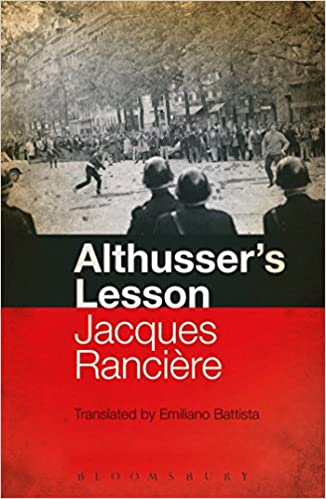
(Jacques Rancière's first major work, Althusser's Lesson a...)
Jacques Rancière's first major work, Althusser's Lesson appeared in 1974, just as the energies of May 68 were losing ground to the calls for a return to order. Rancière's analysis of Althusserian Marxism unfolds against this background: what is the relationship between the return to order and the enthusiasm which greeted the publication of Althusser's Reply to John Lewis in 1973? How to explain the rehabilitation of a philosophy that had been declared 'dead and buried on the barricades of May 68'? What had changed? The answer to this question takes the form of a genealogy of Althusserianism that is, simultaneously, an account of the emergence of militant student movements in the '60s, of the arrival of Maoism in France, and of how May 68 rearranged all the pieces anew. Encompassing the book's distinctive combination of theoretical analysis and historical description is a question that has guided Rancière's thought ever since: how do theories of subversion become the rationale for order?
https://www.amazon.com/Althussers-Lesson-Jacques-Ranci%C3%A8re/dp/1350009113/ref=sr_1_1?dchild=1&keywords=Jacques+Ranci%C3%A8re+Althusser%27s+Lesson&qid=1598618789&s=books&sr=1-1
1974
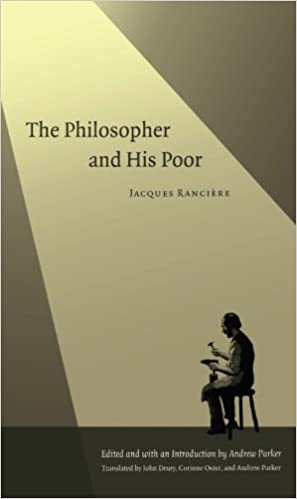
(Jacques Rancière’s The Philosopher and His Poor meditates...)
Jacques Rancière’s The Philosopher and His Poor meditates on these questions in close readings of major texts of Western thought in which the poor have played a leading role - sometimes as the objects of philosophical analysis, sometimes as illustrations of philosophical argument. Published in France in 1983 and made available here for the first time in English, this consummate study assesses the consequences for Marx, Sartre, and Bourdieu of Plato’s admonition that workers should do "nothing else" than their own work. It offers innovative readings of these thinkers’ struggles to elaborate a philosophy of the poor. Presenting a left critique of Bourdieu, the terms of which are largely unknown to an English-language readership, The Philosopher and His Poor remains remarkably timely twenty years after its initial publication.
https://www.amazon.com/Philosopher-His-Poor-Jacques-Ranci%C3%A8re/dp/0822332744/ref=sr_1_1?dchild=1&keywords=The+Philosopher+and+His+Poor&qid=1598618333&s=books&sr=1-1
1983
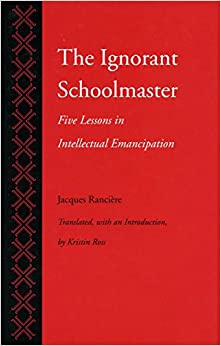
(This extraordinary book can be read on several levels. Pr...)
This extraordinary book can be read on several levels. Primarily, it is the story of Joseph Jacotot, an exiles French schoolteacher who discovered in 1818 an unconventional teaching method that spread panic throughout the learned community of Europe. Knowing no Flemish, Jacotot found himself able to teach in French to Flemish students who knew no French; knowledge, Jacotot concluded, was not necessary to teach, nor explication necessary to learn. The results of this unusual experiment in pedagogy led him to announce that all people were equally intelligent. From this postulate, Jacotot devised a philosophy and a method for what he called "intellectual emancipation" - a method that would allow, for instance, illiterate parents to themselves teach their children how to read. The greater part of the book is devoted to a description and analysis of Jacotot's method, its premises, and (perhaps most important) its implications for understanding both the learning process and the emancipation that results when that most subtle of hierarchies, intelligence, is overturned.
https://www.amazon.com/Ignorant-Schoolmaster-Lessons-Intellectual-Emancipation/dp/0804719691/ref=sr_1_1?dchild=1&keywords=The+Ignorant+Schoolmaster%3A+Five+Lessons+in+Intellectual+Emancipation&qid=1598617845&s=books&sr=1-1
1987
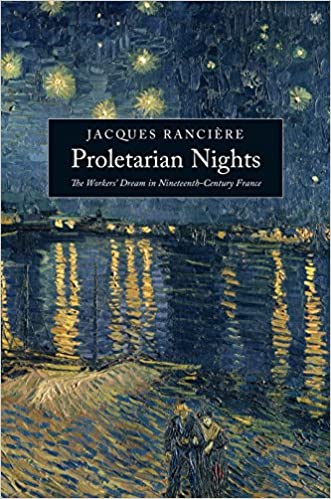
(Proletarian Nights, previously published in English as Ni...)
Proletarian Nights, previously published in English as Nights of Labor and one of Rancière’s most important works, dramatically reinterprets the Revolution of 1830, contending that workers were not rebelling against specific hardships and conditions but against the unyielding predetermination of their lives. Through a study of worker-run newspapers, letters, journals, and worker-poetry, Rancière reveals the contradictory and conflicting stories that challenge the coherence of these statements celebrating labor. This updated edition includes a new preface by the author, revisiting the work twenty years since its first publication in France.
https://www.amazon.com/Proletarian-Nights-Workers-Nineteenth-Century-France/dp/1844677788/ref=sr_1_fkmr0_1?dchild=1&keywords=Jacques+Ranci%C3%A8re+The+Nights+of+Labor%3A+The+Workers%27+Dream+in+Nineteenth-Century+France&qid=1598617692&s=books&sr=1-1-fkmr0
1989
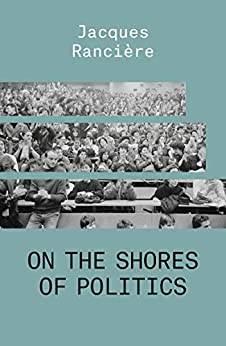
(It is frequently said that we are living through the end ...)
It is frequently said that we are living through the end of politics, the end of social upheavals, the end of utopian folly. Consensual realism is the order of the day. But political realists remarks Jacques Ranciere, are always several steps behind reality, and the only thing which may come to an end with their dominance is democracy.
https://www.amazon.com/Shores-Politics-Jacques-Ranciere-ebook/dp/B084M5QHQD/ref=sr_1_1?dchild=1&keywords=On+the+Shores+of+Politics&qid=1598617910&s=books&sr=1-1
1995
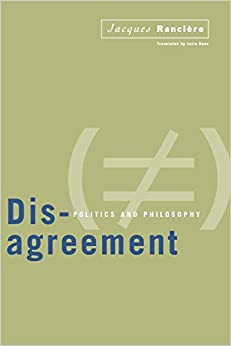
(According to Rancière, the phrase also expresses the para...)
According to Rancière, the phrase also expresses the paradox of politics itself: the absence of a proper foundation. Politics, he argues, begins when the "demos" (the "excessive" or unrepresented part of society) seeks to disrupt the order of domination and distribution of goods "naturalized" by police and legal institutions. In addition, the notion of "equality" operates as a game of contestation that constantly substitutes litigation for political action and community. This game, Rancière maintains, operates by a primary logic of "misunderstanding." In turn, political philosophy has always tried to substitute the "politics of truth" for the politics of appearances. Disagreement investigates the various transformations of this regime of "truth" and their effects on practical politics. Rancière then distinguishes what we mean by "democracy" from the practices of a consensual system in order to unravel the ramifications of the fashionable phrase "the end of politics." His conclusions will be of interest to readers concerned with political questions from the broadest to the most specific and local.
https://www.amazon.com/Disagreement-Politics-Philosophy-Jacques-Ranciere/dp/0816628459/ref=sr_1_1?dchild=1&keywords=Disagreement%3A+Politics+and+Philosophy&qid=1598617966&s=books&sr=1-1
1998
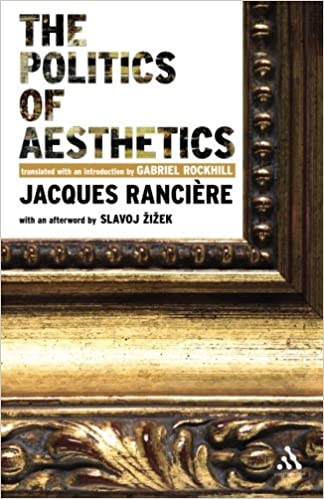
(The Politics of Aesthetics rethinks the relationship betw...)
The Politics of Aesthetics rethinks the relationship between art and politics, reclaiming "aesthetics" from the narrow confines it is often reduced to. Jacques Rancière reveals its intrinsic link to politics by analyzing what they both have in common: the delimitation of the visible and the invisible, the audible and the inaudible, the thinkable and the unthinkable, the possible and the impossible. Presented as a set of inter-linked interviews, The Politics of Aesthetics provides the most comprehensive introduction to Rancière's work to date, ranging across the history of art and politics from the Greek polis to the aesthetic revolution of the modern age. Already translated into five languages, this English edition of The Politics of Aesthetics includes a new afterword by Slavoj Zizek, an interview for the English edition, a glossary of technical terms and an extensive bibliography.
https://www.amazon.com/Jacques-Ranciere/dp/0826489540/ref=sr_1_1?dchild=1&keywords=The+Politics+of+Aesthetics%3A+The+Distribution+of+the+Sensible&qid=1598618218&s=books&sr=1-1
2004
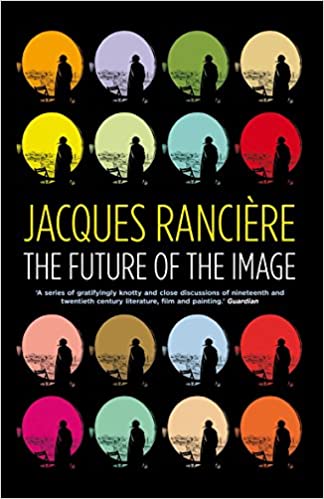
(In The Future of the Image, Jacques Rancière develops a f...)
In The Future of the Image, Jacques Rancière develops a fascinating new concept of the image in contemporary art, showing how art and politics have always been intrinsically intertwined. Covering a range of art movements, filmmakers such as Godard and Bresson, and thinkers such as Foucault, Deleuze, Adorno, Barthes, Lyotard and Greenberg, Rancière shows that contemporary theorists of the image are suffering from religious tendencies. He argues that there is a stark political choice in art: it can either reinforce a radical democracy, or create a new reactionary mysticism. For Rancière there is never a pure art: the aesthetic revolution must always embrace egalitarian ideals.
https://www.amazon.com/Future-Image-Jacques-Ranciere/dp/1844672972/ref=sr_1_1?dchild=1&keywords=The+Future+of+the+Image&qid=1598618421&s=books&sr=1-1
2007
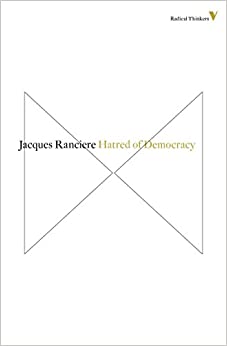
(In this vehement defense of democracy, Jacques Rancière e...)
In this vehement defense of democracy, Jacques Rancière explodes the complacency of Western politicians who pride themselves as the defenders of political freedom. As America and its allies use their military might in the misguided attempt to export a desiccated version democracy, and reactionary strands in mainstream political opinion abandon civil liberties, Rancière argues that true democracy - government by all - is held in profound contempt by the new ruling class. In a compelling and timely analysis, Hatred of Democracy rethinks the subversive power of the democratic ideal.
https://www.amazon.com/Democracy-Radical-Thinkers-Jacques-Ranciere/dp/1781681503/ref=sr_1_1?dchild=1&keywords=Hatred+of+Democracy&qid=1598618456&s=books&sr=1-1
2007
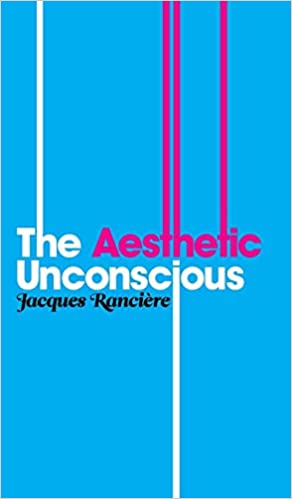
(This book is not concerned with the use of Freudian conce...)
This book is not concerned with the use of Freudian concepts for the interpretation of literary and artistic works. Rather, it is concerned with why this interpretation plays such an important role in demonstrating the contemporary relevance of psychoanalytic concepts. In order for Freud to use the Oedipus complex as a means for the interpretation of texts, it was necessary first of all for a particular notion of Oedipus, belonging to the Romantic reinvention of Greek antiquity, to have produced a certain idea of the power of that thought which does not think, and the power of that speech which remains silent. From this it does not follow that the Freudian unconscious was already prefigured by the aesthetic unconscious. Freud's 'aesthetic' analyses reveal instead a tension between the two forms of unconscious. In this concise and brilliant text Rancière brings out this tension and shows us what is at stake in this confrontation.
https://www.amazon.com/Aesthetic-Unconscious-Jacques-Ranci%C3%A8re/dp/0745646433/ref=sr_1_1?dchild=1&keywords=The+Aesthetic+Unconscious&qid=1598618527&s=books&sr=1-1
2009
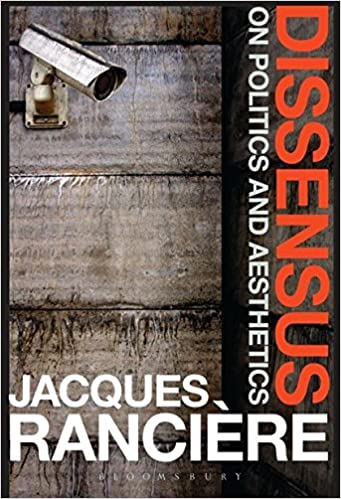
(Dissensus: On Politics and Aesthetics brings together som...)
Dissensus: On Politics and Aesthetics brings together some of Jacques Rancière's most recent writings on art and politics to show the critical potential of two of his most important concepts: the aesthetics of politics and the politics of aesthetics. In this fascinating collection, Rancière engages in a radical critique of some of his major contemporaries on questions of art and politics: Gilles Deleuze, Antonio Negri, Giorgio Agamben, Alain Badiou and Jacques Derrida. The essays show how Rancière's ideas can be used to analyse contemporary trends in both art and politics, including the events surrounding 9/11, war in the contemporary consensual age, and the ethical turn of aesthetics and politics. Rancière elaborates new directions for the concepts of politics and communism, as well as the notion of what a 'politics of art' might be. This important collection includes several essays that have never previously been published in English, as well as a brand new afterword. Together these essays serve as a superb introduction to the work of one of the world's most influential contemporary thinkers.
https://www.amazon.com/Dissensus-Politics-Aesthetics-Jacques-Ranci%C3%A8re/dp/1472583558/ref=sr_1_1?dchild=1&keywords=Dissensus%3A+On+Politics+and+Aesthetics&qid=1598618616&s=books&sr=1-1
2010
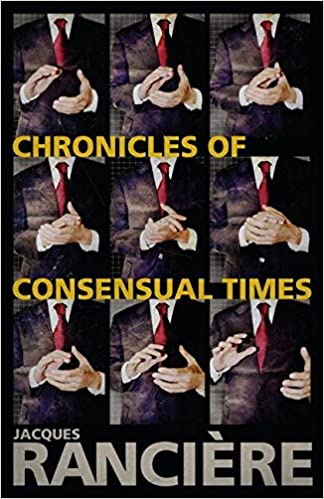
(In this fascinating collection, Jacques Ranciere, one of ...)
In this fascinating collection, Jacques Ranciere, one of the world's most important and influential living philosophers, explores the nature of consensus in contemporary politics. Consensus does not mean peace. Instead it refers to a map of operations of war, of a topography of the visible, of what is possible and what can be thought, in which war and peace live side-by-side. Lying at the heart of these consensual times are new forms of racism and ethnic cleansing, humanitarian wars and wars against terror. Consensus also implies using time in a way that sees in it a thousand devious turns. This is evident in the incessant diagnoses of the present and of amnesiac politics, in the farewells to the past, the commemorations, and the calls to remember. But all these twists and turns tend toward the same goal: to show that there is only one reality to which we are obliged to consent. What stands in the way of this undertaking is politics. These chronicles aim to re-open that space wherein politics once more becomes thinkable.
https://www.amazon.com/Chronicles-Consensual-Times-Jacques-Ranciere/dp/0826442889/ref=sr_1_fkmr0_1?dchild=1&keywords=Jacques+Ranci%C3%A8re+Chronicles+of+Consensual+Times&qid=1598618661&s=books&sr=1-1-fkmr0
2010
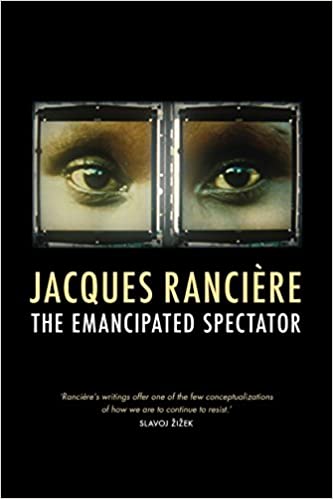
(The theorists of art and film commonly depict the modern ...)
The theorists of art and film commonly depict the modern audience as aesthetically and politically passive. In response, both artists and thinkers have sought to transform the spectator into an active agent and the spectacle into a communal performance. In this follow-up to the acclaimed The Future of the Image, Rancière takes a radically different approach to this attempted emancipation. First asking exactly what we mean by political art or the politics of art, he goes on to look at what the tradition of critical art, and the desire to insert art into life, has achieved. Has the militant critique of the consumption of images and commodities become, ironically, a sad affirmation of its omnipotence?
https://www.amazon.com/Emancipated-Spectator-Jacques-Ranciere/dp/1844677613/ref=sr_1_1?dchild=1&keywords=Jacques+Ranci%C3%A8re+The+Emancipated+Spectator&qid=1598618571&s=books&sr=1-1
2011
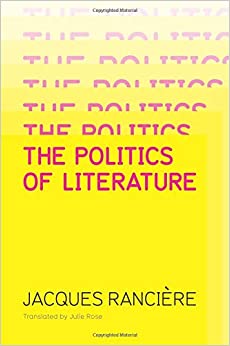
(The politics of literature is not the same as the politic...)
The politics of literature is not the same as the politics of writers and their commitments, nor does it concern the way writers represent social structures or political struggles. The expression 'politics of literature' assumes that there is a specific connection between politics as a form of collective practice and literature as a historically determined regime of the art of writing. It implies that literature intervenes in the parceling out of space and time, place and identity, speech and noise, the visible and the invisible, that is the arena of the political. This book seeks to show how the literary revolution shatters the perceptible order that underpinned traditional hierarchies, but also why literary equality foils any bid to place literature in the service of politics or in its place. It tests its hypotheses on certain writers: Flaubert, Tolstoy, Hugo, Mallarmé, Brecht, and Borges, to name a few. It also shows the consequences of this for psychoanalytical interpretation, historical narration, and philosophical conceptualization.
https://www.amazon.com/Politics-Literature-Jacques-Ranciere/dp/0745645313/ref=sr_1_3?dchild=1&keywords=Jacques+Ranci%C3%A8re+The+Politics+of+Literature&qid=1598618698&s=books&sr=1-3
2011
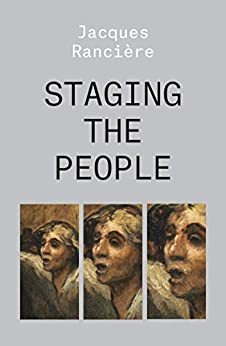
(These essays from the 1970s mark the inception of the dis...)
These essays from the 1970s mark the inception of the distinctive project that Jacques Rancière has pursued across forty years, with four interwoven themes: the study of working-class identity, of its philosophical interpretation, of "heretical" knowledge, and of the relationship between work and leisure. For the short-lived journal Les Révoltes Logiques, Rancière wrote on subjects ranging across a hundred years, from the California Gold Rush to trade-union collaboration with fascism, from early feminism to the "dictatorship of the proletariat," from the respectability of the Paris Exposition to the disrespectable carousing outside the Paris gates. Rancière characteristically combines telling historical detail with deep insight into the development of the popular mind. In a new preface, he explains why such "rude words" as "people," "factory," "proletarians" and "revolution" still need to be spoken.
https://www.amazon.com/Staging-People-Proletarian-His-Double-ebook/dp/B005LGUMBU/ref=sr_1_1?dchild=1&keywords=Jacques+Ranci%C3%A8re+Staging+the+People%3A+The+Proletarian+and+His+Double&qid=1598618756&s=books&sr=1-1
2011
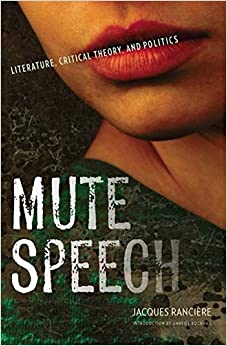
(Jacques Rancière has continually unsettled political disc...)
Jacques Rancière has continually unsettled political discourse, particularly through his questioning of aesthetic "distributions of the sensible," which configure the limits of what can be seen and said. Widely recognized as a seminal work in Rancière's corpus, the translation of which is long overdue, Mute Speech is an intellectual tour de force proposing a new framework for thinking about the history of art and literature. Rancière argues that our current notion of "literature" is a relatively recent creation, having first appeared in the wake of the French Revolution and with the rise of Romanticism. In its rejection of the system of representational hierarchies that had constituted belles-letters, "literature" is founded upon a radical equivalence in which all things are possible expressions of the life of a people. With an analysis reaching back to Plato, Aristotle, the German Romantics, Vico, and Cervantes and concluding with brilliant readings of Flaubert, Mallarmé, and Proust, Rancière demonstrates the uncontrollable democratic impulse lying at the heart of literature's still-vital capacity for reinvention.
https://www.amazon.com/Mute-Speech-Literature-Critical-Directions/dp/0231151039/ref=sr_1_1?dchild=1&keywords=Jacques+Ranci%C3%A8re+Mute+Speech%3A+Literature%2C+Critical+Theory%2C+and+Politics&qid=1598618894&s=books&sr=1-1
2011
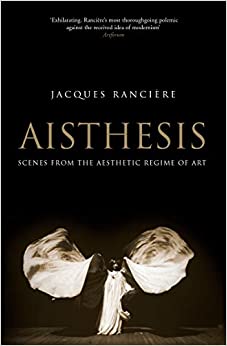
(Composed in a series of scenes, Aisthesis-Rancière’s defi...)
Composed in a series of scenes, Aisthesis-Rancière’s definitive statement on the aesthetic–takes its reader from Dresden in 1764 to New York in 1941. Along the way, we view the Belvedere Torso with Winckelmann, accompany Hegel to the museum and Mallarmé to the Folies-Bergère, attend a lecture by Emerson, visit exhibitions in Paris and New York, factories in Berlin, and film sets in Moscow and Hollywood. Rancière uses these sites and events - some famous, others forgotten - to ask what becomes art and what comes of it. He shows how a regime of artistic perception and interpretation was constituted and transformed by erasing the specificities of the different arts, as well as the borders that separated them from ordinary experience. This incisive study provides a history of artistic modernity far removed from the conventional postures of modernism.
https://www.amazon.com/Aisthesis-Scenes-Aesthetic-Regime-Art-ebook/dp/B00DQAQYVA/ref=sr_1_1?dchild=1&keywords=Jacques+Aisthesis%3A+Scenes+from+the+Aesthetic+Regime+of+Art&qid=1598618989&s=books&sr=1-1
2013

(From Almanac of Fall (1984) to The Turin Horse (2011), re...)
From Almanac of Fall (1984) to The Turin Horse (2011), renowned Hungarian filmmaker Béla Tarr has followed the collapse of the communist promise. The "time after" is not the uniform and morose time of those who no longer believe in anything. It is the time when we are less interested in histories and their successes or failures than we are in the delicate fabric of time from which they are carved. It is the time of pure material events against which belief will be measured for as long as life will sustain it.
https://www.amazon.com/B%C3%A9la-Tarr-Time-After-Univocal/dp/1937561151/ref=sr_1_1?dchild=1&keywords=Jacques+Bela+Tarr%2C+the+Time+After&qid=1598619050&s=books&sr=1-1
2013
Jacques Rancière was born on June 10, 1940, in Algiers, Alger, Algeria. He spent his childhood partly in Algeria and partly in Marseille.
Rancière studied philosophy at the École Normale Supérieure in Paris under the structuralist Marxist philosopher Louis Althusser.
In 1969 Jacques Rancière joined the philosophy faculty of the newly created Centre Universitaire Expérimental de Vincennes, which became the University of Paris VIII in 1971. He remained there until his retirement as professor emeritus in 2000. He also served as a professor of philosophy at the European Graduate School in Saas-Fee, Switzerland.
Rancière contributed to the original French edition of Althusser’s Lire "Le Capital" (1965; Reading Capital), which attempted to elucidate a scientific theory of history in the later works of Karl Marx. Following the uprising of students and workers in Paris in May 1968, however, he broke with his former teacher, charging that Althusser’s emphasis on the necessary role of the intellectual vanguard (in disabusing the masses of bourgeois ideology) was contradicted by the self-directed popular revolts in the streets of Paris that year. In opposition to Althusser’s "theoreticist" Marxism, Rancière held that workers are perfectly capable of understanding their own oppression and of emancipating themselves without guidance from an elite class of theoreticians. He subsequently explored what he considered to be the common assumption among Western philosophers that workers are incapable of serious thought, arguing in Le Philosophe et ses pauvres (1983; The Philosopher and His Poor) that Western philosophy since Plato has defined itself in direct opposition to manual labour.
Rancière’s major published works, in addition to those mentioned above, include La Nuit des prolétaires (1981; The Nights of Labor: The Workers’ Dream in Nineteenth-Century France), Mots de l’histoire: essai de poétique du savoir (1992; The Names of History: On the Poetics of Knowledge), Partage du sensible: esthétique et politique (2000; The Politics of Aesthetics: The Distribution of the Sensible), and Le Spectateur émancipé (2008; The Emancipated Spectator).
Jacques Rancière is particularly known for his work on equality and for his writings on art, literature, and film. His thinking has gradually come into prominence in the English-speaking world in the last decades, especially in the fields of political theory, education, and aesthetics. It is today an influential paradigm in those parts of the humanities and social sciences interested in continental philosophy.
(Proletarian Nights, previously published in English as Ni...)
1989(These essays from the 1970s mark the inception of the dis...)
2011(Jacques Rancière’s The Philosopher and His Poor meditates...)
1983(Dissensus: On Politics and Aesthetics brings together som...)
2010(A classic work of Marxist analysis, available unabridged ...)
1965(Jacques Rancière has continually unsettled political disc...)
2011(In The Future of the Image, Jacques Rancière develops a f...)
2007(The politics of literature is not the same as the politic...)
2011(In this fascinating collection, Jacques Ranciere, one of ...)
2010(In this vehement defense of democracy, Jacques Rancière e...)
2007(Jacques Rancière's first major work, Althusser's Lesson a...)
1974(The Politics of Aesthetics rethinks the relationship betw...)
2004(Composed in a series of scenes, Aisthesis-Rancière’s defi...)
2013(From Almanac of Fall (1984) to The Turin Horse (2011), re...)
2013(It is frequently said that we are living through the end ...)
1995(According to Rancière, the phrase also expresses the para...)
1998(This book is not concerned with the use of Freudian conce...)
2009(The theorists of art and film commonly depict the modern ...)
2011(This extraordinary book can be read on several levels. Pr...)
1987Jacques Rancière is an atheist.
Rancière is a proponent of Marxism and a prominent contributor to its modern vision.
The central theme of Rancière’s educational and political philosophies is radical equality. According to him, the division of labour, responsibility, and power characteristic of inegalitarian social orders is based in part on spurious assumptions about differences in the mental capacities of individuals. The supposition that some people are naturally more intelligent than others is, he insists, unsupported by differences in educational achievement and other evidence, all of which can be accounted for in other ways. In Le Maître ignorant: cinq leçons sur l’émancipation intellectuelle (1987; The Ignorant Schoolmaster: Five Lessons in Intellectual Emancipation), he cited work by the 19th-century French educational theorist Jean-Joseph Jacotot to argue that anyone, no matter what his educational background, can teach anything to anyone else by using pedagogical techniques that enable students to discover and develop their own intellectual powers.
According to Rancière, all social orders are reinforced by and reflected in the "distribution of the sensible" - the complex of individuals and individual speech ("bodies" and "voices") that are effectively visible, sayable, or audible (or invisible, unsayable, or inaudible), together with implicit assumptions about the natural capacities of different individuals and groups. In some societies, for example, blue-collar workers, the poor, the unemployed, immigrants, ethnic minorities, and other groups may be largely unrecognized and their aspirations, complaints, and interests not so much dismissed as simply unseen or unheard. Correlatively, workers as a class may be tacitly perceived as lazy, ignorant, and selfish. For Rancière, politics rightly understood is the inherently disruptive attempt by those who are victimized or excluded by inegalitarian social orders ("the part without part") to assert themselves as the equals of those with privilege and power. To the extent that such efforts are successful, the distribution of the sensible is redrawn in more egalitarian ways.
In Rancière’s idiosyncratic usage, the term "police" refers to the rules and conventions that enforce inegalitarian distributions of the sensible, together with the broadly ideological beliefs and values that justify inegalitarian social orders as fair, democratic, inclusive, consensus-based, or in some sense natural or necessary. Examples of the latter include the public-private distinction, which is used to exclude salary disputes from the scope of public decision-making; the notion of national cultural identity, which is used to support restrictions on the rights of immigrant groups; and the theme of political or economic "realism," which is used to cast the inegalitarian status quo as necessary and to dismiss those who disagree as utopian dreamers. The function of the police is thus to prevent the outbreak of genuine politics as Rancière understands it.
One of the more original aspects of Rancière’s thought is his emphasis on the "aesthetic" dimension of politics and the "political" dimension of aesthetics. Politics is aesthetic in a broad sense insofar as it is concerned with the "sensible" distributions that constitute social hierarchies, and aesthetics is political in the sense that historically important conceptions of the nature of art and of the role of the artist - the broadest of which Rancière calls artistic "regimes" - determine distributions of the sensible in the artistic domain and lend insight into the distributions that characterize a larger society.
Rancière distinguishes three artistic regimes: the ethical, the representational, and the aesthetic. Under the "ethical regime of images," which he associates with the ideal state of Plato, art strictly speaking does not exist, and visual or literary images, understood as copies of things that are real or true are produced only to reinforce the social order. The "representational regime of art," which begins with Aristotle, defines hierarchies of artistic forms, recognizes the distinctive nature of artistic creativity, and frees the artist from direct service to the state, though his work is still expected to serve a salutary purpose. Under the "aesthetic regime of art," which encompasses the rise of Modernism, the Classical hierarchies and conventions are overthrown in novel mixtures of forms and subjects; religious and aristocratic themes are replaced by those more closely approximating everyday life; and art is recognized as valuable in itself. Because it thus involves a radical assertion of equality against the hierarchies of art, the aesthetic regime, according to Rancière, serves as an analog of political action against the hierarchies of society.
Quotations:
"To explain something to someone is first of all to show him he cannot understand it by himself."
"Keeping a monopoly on legitimate violence is still the proven best way to limit violence and allow reason some asylum where it can be freely practiced."
"Whoever teaches without emancipating stultifies."
"To teach what one doesn't know is simply to ask questions about what one doesn't know."
"It is easier to compare oneself, to establish social exchange as that swapmeet of glory and contempt where each person receives a superiority in exchange for the inferiority he confesses to."
Like many of Althusser’s students, Rancière was an active member of the Union des Étudiants Communistes.
Jacques Rancière is known for his critical mind and schematic, sometimes pedantic way of thinking.
There is very little information on Jacques Rancière's private life. It is known that he has a son Romain Rancière, who is an economist.
